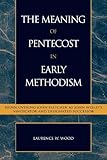The meaning of Pentecost in early Methodism : rediscovering John Fletcher as Wesley's vindicator and designated successor / Laurence W. Wood.
Material type: TextSeries: Pietist and Wesleyan studies ; no. 15.Publication details: Lanham, Md. : Scarecrow Press, 2002.Description: 1 online resource (xxi, 401 pages)Content type:
TextSeries: Pietist and Wesleyan studies ; no. 15.Publication details: Lanham, Md. : Scarecrow Press, 2002.Description: 1 online resource (xxi, 401 pages)Content type: - 9781461673200
- 1461673208
- Fletcher, John, 1729-1785
- Fletcher, John, 1729-1785
- La Fléchère, Jean Guillaume de, (1729-1785)
- Pentecostalism -- Methodist Church -- History -- 18th century
- Methodist Church -- Doctrines -- History -- 18th century
- Mouvement charismatique -- Église méthodiste -- Histoire -- 18e siècle
- Église méthodiste -- Doctrines -- Histoire -- 18e siècle
- RELIGION -- Christianity -- Methodist
- Pentecostalism -- Methodist Church
- Methodist Church -- Doctrines
- Methodismus
- Pfingstbewegung
- Pentecôte -- Église méthodiste -- 18e siècle
- Église méthodiste -- Doctrines -- 18e siècle
- 1700-1799
- 287/.092 22
- BX8349.P46 W66 2002eb
- online - EBSCO
| Item type | Current library | Call number | URL | Status | Notes | Barcode | |
|---|---|---|---|---|---|---|---|
 eBook
eBook
|
Biblioteca "Angelicum" Pont. Univ. S.Tommaso d'Aquino Nuvola online | online - EBSCO (Browse shelf(Opens below)) | Online access | Not for loan (Accesso limitato) | Accesso per gli utenti autorizzati / Access for authorized users | (ebsco)522403 |
Includes bibliographical references (pages 387-393) and index.
Introducing John Fletcher and the forgotten, later Wesley -- Rediscovering Pentecost in early Methodism -- Misunderstanding and reconciliation over the meaning of Pentecost -- Tensions over Fletcher's interpretation of Wesley -- Wesley's authorized interpreter and designated successor -- The theologian of Methodism -- The doctrine of dispensations -- An ecclesiastical dilemma and the Pentecostal solution -- The Pentecostal Wesley and his later sermons -- The Arminian Magazine and Pentecostal perfection -- The Pentecostalism of Mary (Bosanquet) Fletcher -- Some early Methodist preachers and the motif of Pentecost -- Fletcher's legacy in American Methodism -- Fletcher's legacy disputed as the meaning of Pentecost was debated in late nineteenth-century American Methodism -- Wesley and Fletcher on the Anglican rite of confirmation -- The ecumenical relevance of Fletcher's pneumatology for the liturgical renewal movement.
John Fletcher's theology of Pentecost is generally unknown today, and this book is the first comprehensive treatise on this subject. His writings were in large part responsible for shaping the theology of early American Methodism, especially his treatise on Christian Perfection, which highlighted a theology of Pentecostal sanctification. Wood recounts the decisive influence Fletcher had on early Methodism, and shows that his writings were able to "control the opinions of the largest and most effective body of evangelical clergymen of the earth." Fletcher's views on the Holy Spirit were also relevant in the ecumenical movement, specifically with reference to the World Council of Churches Commission on Faith and Order held in Lima, Peru, in 1982. This group recommended the introduction of a liturgy of the Spirit in Christian baptism.
Print version record.


